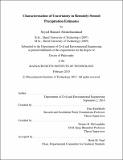Characterization of uncertainty in remotely-sensed precipitation estimates
Author(s)
Alemohammad, Seyed Hamed
DownloadFull printable version (7.456Mb)
Other Contributors
Massachusetts Institute of Technology. Department of Civil and Environmental Engineering.
Advisor
Dara Entekhabi and Dennis B. McLaughlin.
Terms of use
Metadata
Show full item recordAbstract
Satellite-derived retrievals of precipitation have increased in availability and improved in quality over the last decade. There are now several satellites in orbit with instruments capable of precipitation retrieval with various degrees of accuracy, spatial resolution and temporal sampling. These retrievals have the advantage of almost full global coverage when compared to surface gauges and ground-based radars. However, there are uncertainties associated with each of these retrievals. This thesis focuses on developing a new framework for characterizing uncertainties in remotely-sensed precipitation estimates. This characterization is a prerequisite if these estimates are to be used in hydrological models. Precipitation forcing is the primary source of uncertainty in surface hydrological models used for forecasting and data assimilation. In the first part of the thesis, a new metric of error is applied to evaluate precipitation products from Special Sensor Microwave/Imager (SSM/I) instrument. The SSM/I microwave measurements are used for quantitative precipitation rate retrievals and they are key to the development of precipitation data products with high temporal sampling. Results show marked seasonality and precipitation intensity dependence as well as a lower bias at higher intensities and in geographic locations where precipitation rates are generally higher. Next, a new stochastic method is developed to generate spatially intermittent precipitation replicates. These replicates constitute a prior population that can be updated in a Bayesian framework using observations. Bayesian approach allows us to both merge different measurements and investigate the associated uncertainties. Finally, a new ensemble-based approach to the characterization of uncertainties (in both magnitude (intensity) and phase (location)) associated with precipitation retrieval from space-born instruments is introduced. Unlike previous studies, this method derives the error likelihood using an archive of historical measurements and provides an ensemble characterization of measurement error. The ensemble replicates are generated using the proposed stochastic method, and they are intermittent in space and time. The replicates are first projected in a low-dimensional subspace using a problem-specific set of attributes. The attributes are derived using a dimensionality-reduction approach that takes advantage of singular value decomposition. A non-parametric importance sampling technique is formulated in terms of the attribute vectors to solve the Bayesian sampling problem. Results indicate that this ensemble estimation approach provides a useful description of precipitation uncertainties with posterior ensemble that is narrower in distribution than its prior.
Description
Thesis: Ph. D., Massachusetts Institute of Technology, Department of Civil and Environmental Engineering, 2015. This electronic version was submitted by the student author. The certified thesis is available in the Institute Archives and Special Collections. Cataloged from student-submitted PDF version of thesis. Includes bibliographical references (pages 141-156).
Date issued
2015Department
Massachusetts Institute of Technology. Department of Civil and Environmental EngineeringPublisher
Massachusetts Institute of Technology
Keywords
Civil and Environmental Engineering.